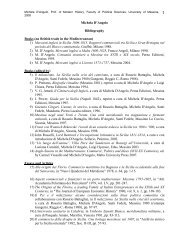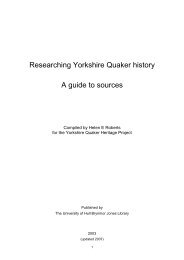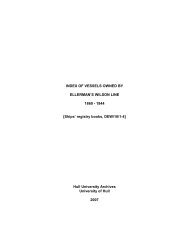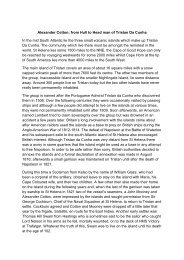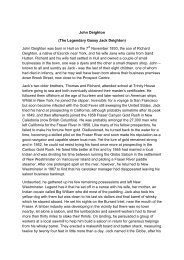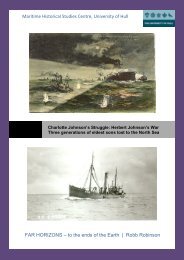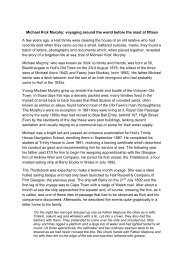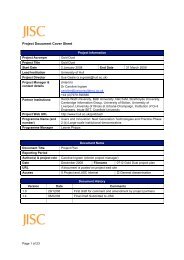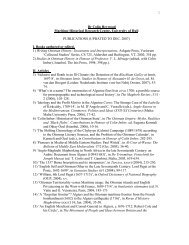The North Atlantic Fisheries, 1100-1976 - University of Hull
The North Atlantic Fisheries, 1100-1976 - University of Hull
The North Atlantic Fisheries, 1100-1976 - University of Hull
You also want an ePaper? Increase the reach of your titles
YUMPU automatically turns print PDFs into web optimized ePapers that Google loves.
2. Discussion <strong>of</strong> Britain’s fisheries is uneven in topical terms. A new<br />
appraisal should embrace all facets <strong>of</strong> the activity through the ages in<br />
order to ensure balance and enhance understanding. Too frequently the<br />
focus has been narrowly confined to a single, usually dynamic, element<br />
<strong>of</strong> a broad, complex collection <strong>of</strong> activities.<br />
3. Many <strong>of</strong> the accepted explanations <strong>of</strong> the development <strong>of</strong> the<br />
fisheries require revision. For instance, fishing historians, perhaps<br />
sub-consciously, have generally adopted the model <strong>of</strong> the classic<br />
‘industrial revolution’ as the conceptual framework for their studies <strong>of</strong><br />
Britain’s nineteenth-century fisheries. Thus, fishing activity is deemed to<br />
have passed through various stages, being classified as industrial or<br />
pre-industrial according to the nature <strong>of</strong> the gear used or, more<br />
commonly, the means <strong>of</strong> vessel propulsion deployed. This impedes<br />
analysis <strong>of</strong> a broad range <strong>of</strong> fishing operations, for some were changing<br />
at a different rate, and in different ways, than the leading sectors.<br />
Likewise, with regard to labour, the eternal ‘standard <strong>of</strong> living debate’<br />
has been transshipped from the manufacturing districts to the trawling<br />
ports with the result that the so-called ‘industrialization’ <strong>of</strong> the<br />
distant-water fisheries has been viewed as leading to the impoverishment<br />
and immiseration <strong>of</strong> the populations <strong>of</strong> <strong>Hull</strong>, Grimsby and elsewhere. 250<br />
Superficially attractive, such hypotheses need testing rather more<br />
rigorously than has hitherto been attempted.<br />
4. <strong>The</strong> contexts in which Britain’s fisheries have been considered<br />
need to be broadened. This entails comparative and interdisciplinary<br />
work. As the fishing history <strong>of</strong> the British Isles has been studied largely<br />
without regard to the experience <strong>of</strong> other nations exploiting the same<br />
waters it is time that the subject is placed in a European or <strong>North</strong> <strong>Atlantic</strong><br />
setting. This is especially so for the modern era when international<br />
disputes and agreements have exerted a major influence on the character<br />
and prosperity <strong>of</strong> fishing. But it is also true <strong>of</strong> earlier periods in which the<br />
British fought and negotiated for the right to exploit Newfoundland cod<br />
and <strong>North</strong> Sea herring. Similarly, understanding Britain’s fishing<br />
industry would greatly benefit from the input <strong>of</strong> colleagues in other<br />
disciplines. For instance, it is self-evident that the findings <strong>of</strong> marine<br />
biologists on such matters as fish movements and resilience should<br />
inform interpretations <strong>of</strong> past as well as current fluctuations in the<br />
prosperity <strong>of</strong> the fisheries. In a like manner, climatologists and<br />
250 Thompson, Living the Fishing.<br />
140




